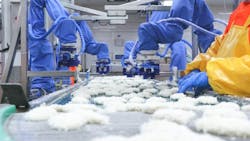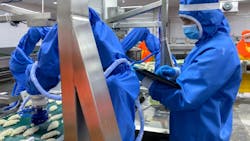Vision-Guided Robot Shapes Breaded Fish into Uniform Shapes
Flexiv, a vision-guided robotics company, created an automated application to shape breaded fish into uniform fillets.
Flexiv (Santa Clara, CA, USA) created the application originally for an unnamed Asian seafood processing company. Executives at the food-processing company wanted to improve production throughput. They also wanted to reduce the company’s dependence on human labor to process the fish.
The food processing company installed four robots in May 2024 and began operating the solution in a production capacity that same month. It added 16 more robots later in 2024, bringing the total number to 20.
Before automating the process, employees shaped the fish manually. This was an exhausting task because they had to do so rapidly without pressing too tightly and potentially damaging the fish.
Related: Robotic System Loads Bobbins in Textile Manufacturing Process
“I think the unique aspects of this application lie in the automation of a process that involves working with soft and delicate materials. Typical automation projects often deal with materials that are rigid. Obviously, dealing with food products, in particular fish, necessitates a very delicate touch. This is something that traditional collaborative robots struggle with, as they don’t have the necessary level of force control required. Flexiv's advanced force control technology, however, allows us to handle these delicate materials with exceptional precision,” says Liang Mao, solution director for new market commercialization at Flexiv.
Key Steps of New Vision Guided Robotic Process
The machine vision system is housed in a custom enclosure, which is mounted above the conveyor belt. Inside the enclosure is an integrated camera and embedded processing hardware.
Here is how the process works:
- Computer vision locates each fillet on the production line.
- Vision algorithms identify the fillet and determine whether it needs shaping.
- Additional algorithms calculate the order in which the fillets should be shaped.
- Using force control, the robots shape the selected fillets.
The robot also cleans the end effector at regular intervals by scraping off bits of food with a specialized tool located within easy reach on the production line.
Related: The HEKUtip QC Assistant Delivers Precise Measurements
Mao declined to provide specifics about the camera, lighting, or embedded processing hardware. However, Mao adds, “I can confirm that illumination variability is not a key challenge for our algorithm, as it is designed to handle dynamic lighting conditions.”
Workers can shut down the process immediately by pressing a single red button. They also can monitor the process using Flexiv’s software.
It is a plug-and-play solution that can be installed in half a day and is designed to work in-line or offline. Employees without previous experience with robots can operate the system.
Related: Vision System Enables Robotic Picking at Industrial Bakery
The robots can be installed without protective fencing. As Mao explains, “Our adaptive robots feature whole-body force control, which eliminates the need for barriers. This is because our robots have a response rate of 5 kHz and 1 kHz, allowing them to sense obstacles before a human would. This superhuman reaction speed enables the robots to dynamically respond to obstacles by either moving in the opposite direction or halting all movement instantaneously.”
About the Author
Linda Wilson
Editor in Chief
Linda Wilson joined the team at Vision Systems Design in 2022. She has more than 25 years of experience in B2B publishing and has written for numerous publications, including Modern Healthcare, InformationWeek, Computerworld, Health Data Management, and many others. Before joining VSD, she was the senior editor at Medical Laboratory Observer, a sister publication to VSD.


